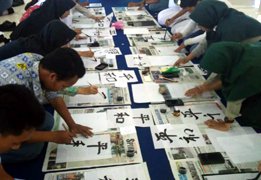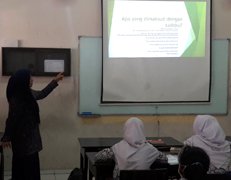Japanese-Language Specialists’ Report
The Japan Foundation, Jakarta
(Central Java Province/Special Region of Yogyakarta Secondary Educational Institutions)
OKAMOTO Taku
The Central Java Province and the Special Region of Yogyakarta (hereinafter “Jogja”) are located adjacent to the center of Java Island, and together they have a land area that could completely contain Kyushu. As of 2019, Semarang, Central Java’s provincial capital, prospers as the 10th largest city by population, and in recent years a growing number of foreign companies have been setting up business there also. On the other hand, the influence of the former imperial dynasty era remains in Jogja even today, and it is home to a large number of world-famous sightseeing spots such as the former imperial court. Japanese-language education is also booming in these two regions – there are 10 teachers’ associations of various sizes within the province and the region, and more than 200 Japanese-language teachers belong to them. All the teachers diligently apply themselves day after day, while encouraging each other to improve their Japanese-language ability and teaching skills.
Supporting Teachers Online
In the region that I oversee, I have been searching for new online-based formats for teacher support since 2018. I am undertaking new initiatives to reduce teachers’ geographical and time constraints and make them possible to keep up Japanese-language learning more readily. One such initiative is the “Online Japanese-language Conversation Club for Teachers” (hereinafter the “Conversation Club”), and another is the “Online Composition Class” (hereinafter the “Composition Class”). The Conversation Club is an online meeting held twice a month, and it presents teachers in the region with an opportunity to speak Japanese. The teachers spend around 30 minutes conversing about a topic with a Japanese national, in the Japanese language. The Conversation Club is being extremely well-received, with teachers noting that it allows them “to regain the Japanese I was starting to forget.” Meanwhile, the Composition Class is an activity started from this year with the goal of improving the writing ability of teachers who have fewer opportunities in their everyday lives to produce compositions of any sizeable length. Assignment submissions, feedback and other exchanges have all been carried out using Google Classroom, a free learning management system provided by Google LLC. Google Classroom is extremely convenient as a tool for supporting the teachers based in the region I oversee.
Conventionally, activities such as mentioned above are support that has been undertaken at study groups and other fora hosted by the teachers’ associations, but recently there has been a large number of teachers who want to participate but are unable to due to their regional or time situations. So, after pondering whether there was some good way of maintaining teachers’ motivation and desire to improve, these were the measures I arrived at. From here on also, I intend to continue searching for ways of providing support that are aligned to the times, while maintaining conventional support formats also.
Cultural Festival is Also a Venue for Education that is Aligned to the Times
The high school culture festival, which is hosted by the Central Java Province and Jogja’s joint teachers’ association, was held in January 2019. This year the festival was held at SMK Bhakti Putra Bangsa Purworejo, a vocational high school. The teachers’ association in the region where the venue school is located served as the executive committee, and undertook the preparation and running of the festival. The culture festival features a variety of content every year, and the high school students perform the outcomes of their day-to-day learning. The contest events included Japanese speech, Shodo (calligraphy), poster presentation and group recitation (performance in which poems and other writings are read aloud as a group). And as new endeavors this time, there was also a school introduction video contest and a Japanese-language Kahoot! quiz tournament (Kahoot! is a free game-based online learning platform). It appears that the executive committee, after many discussions, has adopted such new features into the event and continued to adjust it up to date so that it becomes an opportunity for nurturing the next generation’s skills rather than just a culture festival.

The theme of this year’s culture festival was “Wishing for Peace.”
Putting Tadoku Reading* Classes into Practice
Tadoku reading has been gradually catching on as an activity since the Tadoku reading workshop** held in the previous fiscal year. Let me introduce an example of a Tadoku reading class I observed recently. The students were first-year vocational high school students who have four hours of Japanese-language classes per week. When I observed their class, they were still at the stage of needing the Japanese kana chart to read characters, having only just finished learning hiragana. At the start of the Tadoku reading class, to begin with the students choose the Tadoku reading teaching material they like from among the material prepared by the teacher, and form pairs to work together and read it. The elementary-level Tadoku reading teaching material contains a rich array of color illustrations and photos that are matched to simple, short sentences. This makes it possible for even starters who cannot read sentences to enjoy reading visually. On the day I observed the class, the students were cheerfully experiencing the Japanese language – they were appreciating Japanese culture and scenery from the illustrations and photos, while consulting the Japanese kana chart to decipher the hiragana with all their might and occasionally asking the teacher for help. After they had finished reading, the students stood at the front of the class in pairs and read the section they found most interesting aloud. Following that, they gave a simple introduction in Indonesian of the story they had read. They did it great, while making up from the pictures with their imagination when they did not fully understand the stories. These classes give the students fun exposure to the Japanese language even though they are only starters, and every time they encounter a word or expression first time, I expect it also brings their interest in the Japanese language higher.

Students listening attentively to the teacher explaining the rules of Tadoku reading
* Tadoku reading is a method of foreign language learning in which learners begin by reading sentences that match their own level and continue reading without concern even if they encounter words or grammar they do not understand. The learners acquire the language as a result of this repeated, enjoyable input. (According to NPO Tadoku Supporters)
**For details on the fiscal 2018 Tadoku reading workshop, please refer to the previous fiscal year’s report.
- What We Do Top
- Arts and Cultural Exchange [Culture]
- Japanese-Language Education Overseas [Language]
- Japanese-Language Education Overseas [Language] Top
- Learn Japanese-language
- Teach Japanese-language
- Take Japanese-Language Test
- Know about Japanese-language education abroad
- The Japanese-Language Institute, Urawa
- The Japanese-Language Institute, Kansai
- Japanese-Language Programs for Foreign Specified Skilled Worker Candidates
- Japanese Language Education for Japanese Children Resident Overseas and for the Descendants of Migrants
- Archives
- Japanese Studies and Global Partnerships [Dialogue]
- JF digital collection
- Other Programs / Programs to Commemorate Exchange Year
- Awards and Prizes
- Publications
